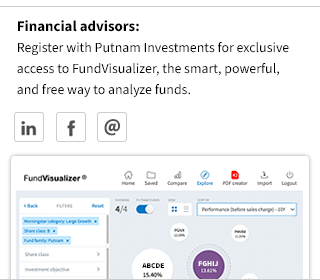Q4 2021 Putnam Growth Opportunities Fund Q&A
- For the quarter, large-cap growth stocks outperformed the broader market as well as their large-cap value counterparts.
- We believe consumer spending will shift back toward services, as evidenced by our newest growth theme — “the experience economy.”
- We combine company-specific factors with a top-down thematic lens, and there are currently 12 themes across the holdings in our portfolio.
How were investing conditions in the fourth quarter, and how did large-cap stocks fare?
For the quarter, large-cap growth stocks outperformed the broader market as well as their large-cap value counterparts. They also outperformed small-cap growth and small-cap value stocks. The gains in equities are notable considering the number of headwinds impacting financial markets. Ongoing issues included supply chain disruptions, concerns about inflation, and potential interest-rate hikes. However, another disruptive force was the discovery of Omicron, a new coronavirus variant that brought a surge in Covid-19 cases and worries about additional shutdowns. Despite these issues, equity markets ended 2021 with healthy gains, including the third straight year of double-digit gains for the S&P 500 Index.
What are your thoughts on managing the portfolio in this market environment?
Our aim is to minimize the impact of economic fluctuations by investing in secular growers with defensible economic moats and the potential for high, sustainable long-term returns. We believe inflation is a legitimate concern for investors, and it is likely to be a persistent headwind for many companies. Businesses that can price against inflation, a core criteria for our strategy, will fare better than companies that are unable to pass through higher input costs such as materials and labor. Some of the inflation in the market is caused by cyclical forces — such as shortages of goods — that we believe will ease in the foreseeable future as supply chain issues are resolved.
What are some areas of the market that offer opportunities in the year ahead?
Strong demand and high savings rates should prove to be positive forces for consumer spending. While rising prices have yet to impact demand, we are open to the fact that they could do so later this year. Looking ahead, at a high level, we believe consumer spending will shift back toward services, as evidenced by our newest growth theme — “the experience economy.”
This theme is based on a growing preference for experiences over material possessions. An increasing number of consumers are seeking to spend their money on live entertainment and events, luxury travel and destinations, or interactions within social communities. We have observed this trend among younger consumers for many years, but we believe the appeal of experiences has become more widespread after the pandemic lockdowns and isolation. This growing demand, combined with higher levels of personal savings, should help a number of businesses in our portfolio grow at above-market rates for an extended period of time.
Could you describe some key components of your investment process?
From a fundamental perspective, we apply several criteria when analyzing businesses. One is the level of growth potential for the business and the durability of that growth. We seek companies we believe can grow at above-market rates, regardless of the market context. Assessing growth durability means examining structural and other advantages that indicate a company has strong potential to grow over the longer term. Another notable feature of our process is looking for an ownership culture. This means we seek companies whose management acts like owners, and the interests of their executives align with the interests of their shareholders.
Importantly, we combine these company-specific factors with a top-down thematic lens. There are currently 12 themes across the holdings in our portfolio. Approximately 90% of the companies held by the fund are tied to at least one of these themes.
More in: Equity,


